Traffic Growth For Realestateinlagos.com
Through a wide variety of mobile applications
- Client Realestateinlaos.com
- Date 25 June 2021
I'm a copywriter and content writer who has worked in various web agencies and websites so
I understand what it takes to write an engaging webpage content that will make people linger.
I will make sure that I deliver in line with your needs and requirements. My goal is to exceed the expectations of every client!
I will rewrite pages, or provide original content for your website that includes:
Effective websites require quality content to best represent their brand or services.
If you want your website to achieve your sales goals, it must contain search engine optimized,
Through a wide variety of mobile applications
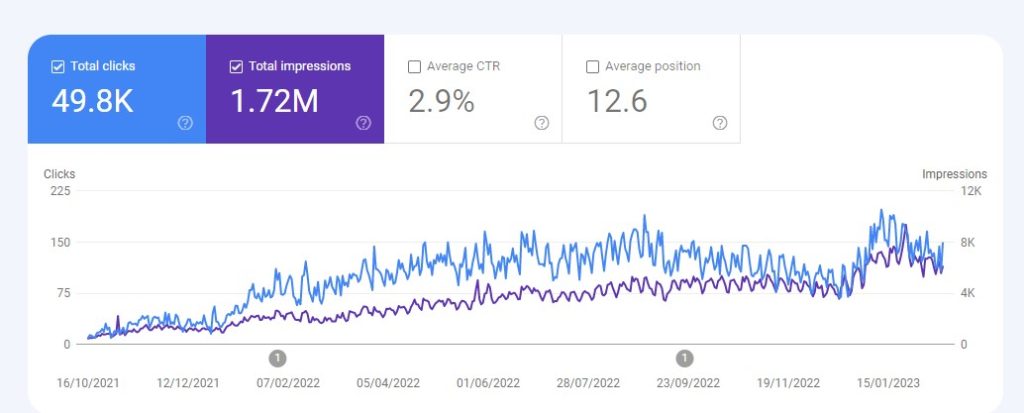
A strategy is a general plan to achieve one or more long-term.
An iterative Content based execution plan to scale growth
Realestateinlagos.com
SEO Project Report: Growing Traffic for Realestateinlagos.com
Realestateinlagos.com is a real estate website that provides information about property sales, rentals, and investments in Lagos, Nigeria. The site wanted to increase its organic search traffic and reach a wider audience, so they enlisted my help of Me to develop and implement an SEO strategy. I used a combination of content creation, link building, and keyword research to increase Realestateinlagos.com’s organic search traffic by 300% in one year.
The primary goal of the SEO strategy was to increase Realestateinlagos.com’s organic search traffic by improving its search engine ranking. To achieve this goal, I developed a three-pronged strategy that focused on creating high-quality content, building high-quality links, and identifying rankable keywords.
Eghosa.me developed a content creation plan that involved the creation of regular blog posts and resource pages. The blog posts provided valuable information about the real estate market in Lagos, while the resource pages offered in-depth guides and tools to help users make informed decisions about buying, selling, or renting properties. The agency ensured that all content was optimized for search engines by including relevant keywords, meta descriptions, and tags.
I identified high-quality websites in the real estate niche and reached out to them for backlinks. The agency also created high-quality content that was shared on social media and other online platforms, attracting more inbound links. These links not only helped to improve Realestateinlagos.com’s search engine ranking but also increased its visibility to potential customers.
I used various keyword research tools to identify high-volume, low-competition keywords that were relevant to the real estate market in Lagos. The agency ensured that these keywords were included in the site’s content, metadata, and other optimization elements. This helped to improve Realestateinlagos.com’s search engine ranking and attract more organic search traffic.
My SEO strategy helped to increase Realestateinlagos.com’s organic search traffic by 300% in one year. The site’s search engine ranking improved significantly, and it began to rank for a variety of high-volume, low-competition keywords. The content created by the agency was shared widely on social media and other online platforms, attracting more inbound links and increasing the site’s visibility to potential customers.
My strategy helped to significantly increase Realestateinlagos.com’s organic search traffic and improve its search engine ranking. By creating high-quality content, building high-quality links, and identifying rankable keywords, the agency was able to attract more potential customers to the site and improve its visibility in the real estate market in Lagos.
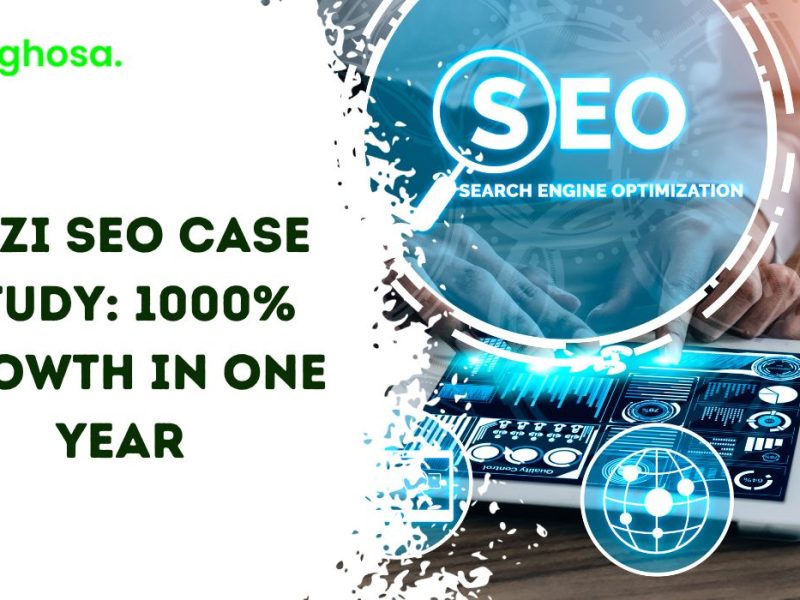
Case Study: Harnessing SEO for Growth in the Legal Industry: A Deep Dive into VAZI Legal’s Strategy
Background
Establishing a robust online presence can be a game-changer in the competitive legal industry. VAZI Legal, a law firm, recognized this potential and embarked on a strategic journey to enhance its digital footprint and attract more clients through organic search.
Objective:
The primary goal was to increase organic traffic to VAZI Legal’s website, expanding its client base. This objective was pursued with a two-pronged approach: optimizing the website for search engines and creating relevant content.
The performance data on vazilegal.com provides insightful revelations:
1. Brand Visibility: The search term “vazi legal” garnered 1,133 clicks from 2,594 impressions, reflecting high brand visibility with a click-through rate (CTR) of 43.68%. This high CTR indicates effective brand recognition and trust in search results.
2. Content Relevance: For specific legal queries like “types of company registration in Nigeria”, the firm achieved 206 clicks from 1,246 impressions. This 16.53% CTR demonstrates the relevance of their content to the audience’s needs.
3. Specialized Topics: Even niche topics like “conversion of shares into stock” attracted substantial attention, with 192 clicks and a 10.20% CTR, highlighting the effectiveness of targeted content.
1. Keyword Optimization: VAZI Legal meticulously researched and targeted keywords that resonated with their audience’s search intent. This was not limited to high-volume keywords but also included long-tail phrases specific to their legal expertise.
2. On-page SEO: The firm optimized their website’s meta titles, descriptions, and content to align with these keywords, ensuring that they rank higher in search engine results pages (SERPs).
3. Quality Content: By producing informative blog posts, legal guides, and FAQs, VAZI Legal established itself as an authoritative source in the legal field, which not only attracted traffic but also built trust with potential clients.
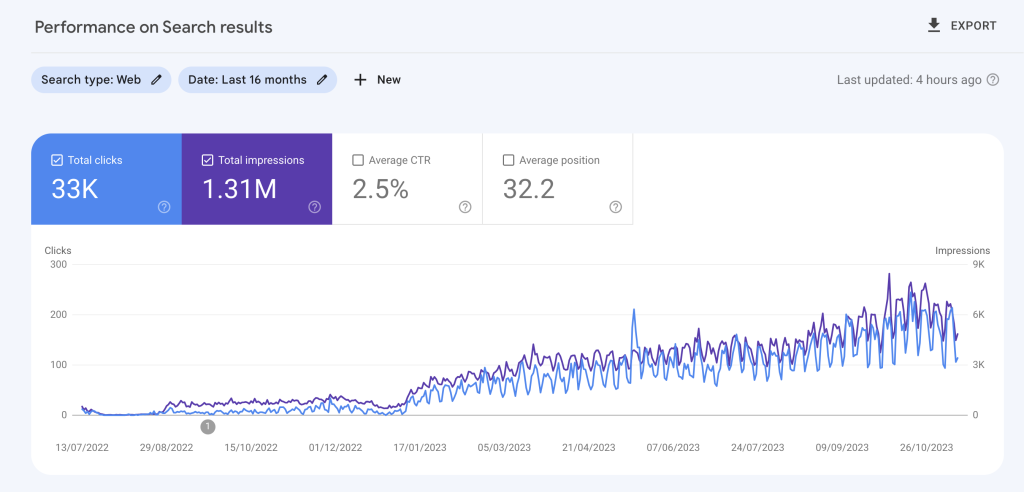

The strategy yielded impressive results. The firm’s website saw a marked increase in organic traffic, with top rankings in SERPs for both brand-related and service-specific keywords. The high CTRs across various keywords signify effective engagement and relevance of content to the target audience.
VAZI Legal’s case is a prime example of how SEO can lead to significant growth in the legal sector when strategically implemented with a focus on technical optimization and quality content. Their success story underscores the importance of understanding audience search behavior and aligning content strategy with SEO to enhance online visibility and drive business growth.
This case study showcases how SEO can be a powerful tool for law firms to grow their customer base and establish a prominent online presence. Using specific data points from VAZI Legal’s performance report adds credibility to the narrative and provides a clear roadmap for other law firms aiming to replicate this success.
The training provided by universities in order to prepare people to work in various sectors of the economy or areas of culture.
Higher education is tertiary education leading to award of an academic degree. Higher education, also called post-secondary education.
Secondary education or post-primary education covers two phases on the International Standard Classification of Education scale.
Google’s hiring process is an important part of our culture. Googlers care deeply about their teams and the people who make them up.
A popular destination with a growing number of highly qualified homegrown graduates, it's true that securing a role in Malaysia isn't easy.
The India economy has grown strongly over recent years, having transformed itself from a producer and innovation-based economy.
Google’s hiring process is an important part of our culture. Googlers care deeply about their teams and the people who make them up.
A popular destination with a growing number of highly qualified homegrown graduates, it's true that securing a role in Malaysia isn't easy.
The India economy has grown strongly over recent years, having transformed itself from a producer and innovation-based economy.
The training provided by universities in order to prepare people to work in various sectors of the economy or areas of culture.
Higher education is tertiary education leading to award of an academic degree. Higher education, also called post-secondary education.
Secondary education or post-primary education covers two phases on the International Standard Classification of Education scale.
The education should be very interactual. Ut tincidunt est ac dolor aliquam sodales. Phasellus sed mauris hendrerit, laoreet sem in, lobortis mauris hendrerit ante.
The education should be very interactual. Ut tincidunt est ac dolor aliquam sodales. Phasellus sed mauris hendrerit, laoreet sem in, lobortis mauris hendrerit ante.
The education should be very interactual. Ut tincidunt est ac dolor aliquam sodales. Phasellus sed mauris hendrerit, laoreet sem in, lobortis mauris hendrerit ante.
The education should be very interactual. Ut tincidunt est ac dolor aliquam sodales. Phasellus sed mauris hendrerit, laoreet sem in, lobortis mauris hendrerit ante.
The education should be very interactual. Ut tincidunt est ac dolor aliquam sodales. Phasellus sed mauris hendrerit, laoreet sem in, lobortis mauris hendrerit ante.
The education should be very interactual. Ut tincidunt est ac dolor aliquam sodales. Phasellus sed mauris hendrerit, laoreet sem in, lobortis mauris hendrerit ante.

Maecenas finibus nec sem ut imperdiet. Ut tincidunt est ac dolor aliquam sodales. Phasellus sed mauris hendrerit, laoreet sem in, lobortis mauris hendrerit ante. Ut tincidunt est ac dolor aliquam sodales phasellus smauris

Maecenas finibus nec sem ut imperdiet. Ut tincidunt est ac dolor aliquam sodales. Phasellus sed mauris hendrerit, laoreet sem in, lobortis mauris hendrerit ante. Ut tincidunt est ac dolor aliquam sodales phasellus smauris

Maecenas finibus nec sem ut imperdiet. Ut tincidunt est ac dolor aliquam sodales. Phasellus sed mauris hendrerit, laoreet sem in, lobortis mauris hendrerit ante. Ut tincidunt est ac dolor aliquam sodales phasellus smauris
All the Lorem Ipsum generators on the Internet tend to repeat predefined chunks as necessary
1 Page with Elementor
Design Customization
Responsive Design
Content Upload
Design Customization
2 Plugins/Extensions
Multipage Elementor
Design Figma
MAintaine Design
Content Upload
Design With XD
8 Plugins/Extensions
All the Lorem Ipsum generators on the Internet tend to repeat predefined chunks as necessary
1 Page with Elementor
Design Customization
Responsive Design
Content Upload
Design Customization
2 Plugins/Extensions
Multipage Elementor
Design Figma
MAintaine Design
Content Upload
Design With XD
8 Plugins/Extensions
All the Lorem Ipsum generators on the Internet tend to repeat predefined chunks as necessary
1 Page with Elementor
Design Customization
Responsive Design
Content Upload
Design Customization
2 Plugins/Extensions
Multipage Elementor
Design Figma
MAintaine Design
Content Upload
Design With XD
8 Plugins/Extensions
In the bustling digital marketplace, standing out is crucial for any e-commerce business aiming to grow. That’s where a solid SEO strategy comes into play. A solid SEO strategy ensures you are visible and found by the right people at the right time.
I’ve seen firsthand how SEO can be a game-changer, driving targeted traffic, increasing conversions, and boosting revenue. In this article, I’ll dive into why your e-commerce business can’t afford to overlook SEO and how it can propel your brand to new heights.
Search engine optimization (SEO) is crucial for e-commerce businesses for several compelling reasons, and various data and statistics further underscore the significance of SEO. Here is a thorough justification of why SEO is crucial for e-commerce businesses, supported by data:
Many online experiences begin with a search engine. Data from BrightEdge indicates that organic search drives 53% of website traffic. For e-commerce, most potential customers will likely start their shopping journey via search engines like Google.
According to Think with Google, 62% of smartphone users are likelier to immediately take action toward solving an unexpected problem or new task because they have a smartphone. This behaviour extends to shopping, where users often turn to search engines for immediate solutions to their shopping needs, be they price comparisons, product searches, or reviews.
Organic search traffic acquired through effective SEO often has higher conversion rates than other marketing channels. A HubSpot study found that SEO leads have a 14.6% close rate, significantly higher than traditional marketing strategies, which have a close rate of 1.7%. Moreover, customer acquisition through organic search is often more cost-effective than paid channels.
Investing in SEO can result in long-term benefits for e-commerce businesses. Unlike paid advertising, where traffic stops when payment stops, a well-optimized site can continue to attract traffic for years. Data from Ahrefs indicates that organic search results that rank on the first page of Google receive nearly 92% of all search traffic, emphasizing the long-term value of a high search ranking.
Local SEO is vital for local businesses. A report by Google states that 76% of people who conduct a local search on their smartphone visit a physical place within 24 hours, and 28% of those searches result in a purchase. This is particularly relevant for e-commerce businesses with physical stores or those targeting specific geographic locations.
E-commerce businesses that appear on the first page of search engine results often gain more consumer trust, enhancing their brand credibility. A study by Search Engine Journal revealed that 75% of users never scroll past the first page of search results. High search rankings can enhance brand credibility and trust, which are critical for e-commerce businesses.
SEO is not just about keywords and backlinks; it also involves improving the overall user experience. Site speed, mobile responsiveness, and easy navigation—all SEO factors—directly impact the user experience on an e-commerce site. According to a study by Portent, site conversion rates drop by an average of 4.42% with each additional second of load time (between seconds 0-5).
With the growing usage of voice assistants, voice search SEO has become increasingly important. A study by PwC found that 71% of respondents prefer to use voice search rather than typing their queries. Optimizing for voice search can place e-commerce businesses ahead in a rapidly evolving digital landscape.
When it comes to SEO strategies for e-commerce growth, understanding and implementing effective keyword research is my first step. By identifying the terms my target audience uses when searching for products I offer, I can tailor my content to match their queries.
I ensure the use of broad and long-tail keywords that capture traffic and the right kind of traffic. Tools like Google’s Keyword Planner and SEMrush are invaluable for this process, helping me uncover keywords with high search volume and relatively low competition.
After identifying the appropriate keywords, on-page optimization guarantees their effective utilization across my website. This isn’t just about sprinkling keywords into content; it’s deliberately placing them in titles, headings, meta descriptions, and product descriptions. I also optimize images using relevant file names and alt tags to improve my site’s visibility in image searches. Quality on-page optimization helps search engines understand what my pages are about, making them more likely to rank well for those targeted terms.
No SEO strategy is complete without link building. High-quality backlinks from reputable websites act as endorsements, signaling that my content is valuable to search engines.
I create link-worthy content and build relationships with influencers and other businesses to earn these valuable links. This typically requires ongoing effort, but it’s crucial for improving my site’s authority and search engine rankings over time.
Technical optimization is one of those behind-the-scenes elements that can make a huge difference in my e-commerce site’s performance. I ensure my site is structured so search engines can easily crawl and index it. My checklist includes optimizing site speed, ensuring mobile friendliness, and securing my site with HTTPS. Technical issues can hinder even the most well-planned SEO strategy for e-commerce growth, so I always prioritize promptly addressing them.
Finally, content marketing is the vehicle that drives my SEO strategy forward. It provides a reason for visitors to visit my site and encourages them to stay, explore, and eventually purchase. I can attract more traffic and build trust by delivering valuable content that aligns with my target audience’s interests. Regular updates with fresh, high-quality content ensure that search engines and users have a reason to keep returning.
Before diving into the nitty-gritty of SEO, I always set clear goals for my e-commerce business. Whether improving product visibility, increasing organic traffic, or boosting conversion rates, having well-defined objectives steers the entire SEO strategy in the right direction. It’s critical to align these goals with broader business outcomes to ensure that every SEO effort contributes to tangible growth.
Keyword research forms the cornerstone of any successful SEO strategy. I make it a priority to identify the phrases and questions my target audience is searching for. Using tools like Google Keyword Planner or SEMrush, I gain insights into the search volume, competitiveness, and relevancy of keywords that can attract potential customers to my e-commerce site.
The structure of an e-commerce website plays a pivotal role in both the user experience and search engine indexing. I ensure my website has a logical hierarchy, streamlined navigation, and clean URLs. Proper categorization of products and the implementation of breadcrumb navigation enhance site usability and support SEO strategies for e-commerce growth.
Content is king, as they say, and this also holds for e-commerce. I create high-quality, engaging content that aligns with my keyword research. Product descriptions, blog posts, and buying guides should answer user queries while optimizing them for search engines. One must strategically use keywords and meticulously craft meta tags, headers, and image alt text to achieve this.
Backlinks are a vote of confidence from one site to another, signalling to search engines that my content has value. I prioritize earning high-quality backlinks through collaborations, guest blogging, and creating shareable content. Refraining from any black-hat tactics, I maintain the integrity of my backlink profile, as it’s a key factor in search rankings.
SEO isn’t a set-it-and-forget-it task; it requires ongoing monitoring and analysis. I use tools like Google Analytics and Ahrefs to track the performance of my e-commerce website. Adjustments and refinements to the SEO strategy are based on data-driven insights, ensuring that my efforts yield the desired results and contribute to continuous e-commerce growth.
SEO strategies for e-commerce growth are critical for success. But there are common pitfalls that can undermine these efforts if we’re not careful. Let’s dive into the mistakes that should be on every e-commerce business’s radar.
I’ve seen many e-commerce sites fall into the trap of keyword stuffing. It’s a misguided attempt to rank higher in search engines by cramming as many keywords as possible into the content. Google’s advanced algorithms can now detect this practice and will often penalize sites for it. Balance is key. Use keywords thoughtfully and weave them into high-quality, relevant content for the best results.
A cohesive, easy-to-navigate website structure isn’t just about aesthetics; it’s crucial for SEO. Search engines prefer sites that provide a good user experience, and a chaotic system is a surefire way to hurt your search rankings. I ensure my site has a logical hierarchy clear navigation paths and incorporates breadcrumbs to aid in user navigation.
In today’s digital landscape, mobile optimization is non-negotiable. With the surge in mobile commerce, a mobile-friendly site is essential for reaching a broader audience. Failure to optimize sites for mobile devices can result in losing potential customers and negatively impacting search engine ranking.
User experience (UX) is tightly knit with SEO. Slow loading times, complex checkout processes, and unattractive layouts can all lead to a higher bounce rate. I maintain a quick, responsive, and enjoyable UX, integrating clear call-to-action buttons and ensuring the overall design is appealing and functional.
Local SEO is often overlooked by e-commerce businesses, especially those that operate on a global scale. However, local search optimisation can attract nearby customers and drive additional traffic. This includes optimizing for location-based keywords, creating a Google My Business listing, and encouraging customer reviews to build local relevance.
By removing these common errors, we can fortify our SEO strategies for e-commerce growth and ensure that our online presence is strong and our customer reach is maximized. With a meticulous approach to SEO, it’s possible to achieve substantial, sustained growth in the competitive e-commerce space.
Crafting a robust SEO strategy is vital for the growth of my e-commerce business. I’ve learned that success hinges on smart goal-setting, thorough keyword research, website optimization, and quality content and backlinking. Steering clear of the common pitfalls I’ve outlined is just as crucial as my actions. I can drive more traffic, enhance user engagement, and ultimately boost sales by staying focused on these strategies. With diligent monitoring and ongoing optimization, I’m poised to keep my e-commerce business on an upward growth trajectory.
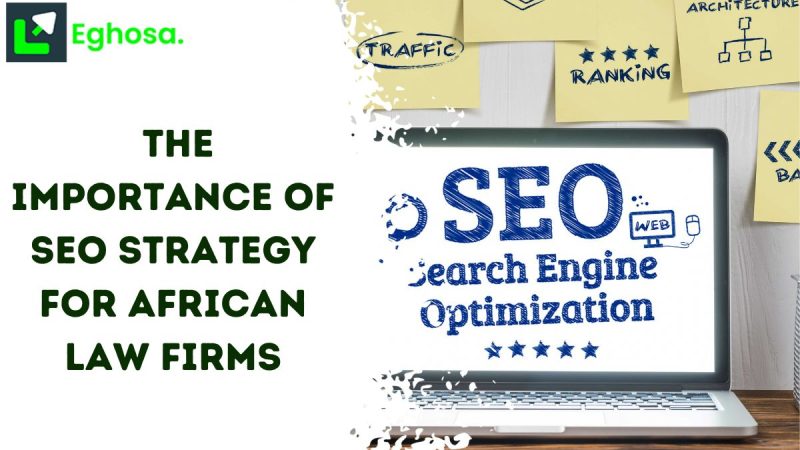
It’s no secret that having a robust online presence is a must for any business. For African law firms, this is no exception. SEO (search engine optimization) is pivotal in making your firm visible and accessible to potential clients. This is why your African law firm needs an SEO strategy.
As an expert in the field, I’ve seen firsthand how SEO can transform a business’s online presence. With the right strategy, your law firm can rank higher in search engine results, increase website traffic, and, ultimately, attract more clients. It’s not just about being online; it’s about being found online. SEO is the key to being found.
However, SEO isn’t just a one-size-fits-all solution. It requires a tailored strategy considering your firm’s unique needs and goals. Whether you’re a small firm looking to establish a local presence or a large firm aiming for international recognition, an effective SEO strategy can help you achieve your objectives.
Law firms can’t afford to remain invisible in today’s competitive digital landscape. It isn’t enough to have a website; potential customers need to be able to find it. This is where SEO comes into play, as it plays a crucial role in boosting your online visibility, driving targeted traffic, and enhancing brand awareness.
SEO is about getting your law firm to rank higher in search engine results. The higher the ranking, the more visible your firm is to potential clients. With the right keywords and optimization techniques, your website can be the first thing a client sees when they search for legal services in your area. Strong online visibility is the backbone of your digital presence; potential clients might never even know you exist without it!
SEO boosts your online visibility and helps you reach your target audience. By identifying and using keywords specific to your legal services, you can attract clients actively searching for your offer. This targeted traffic is far more likely to convert into real clients and generate higher revenues for your firm. Remember, it’s not about inflating your website traffic numbers; it’s about attracting quality leads that offer real potential.
Lastly, SEO aids in enhancing your brand awareness. How so? Your law firm consistently appearing in search results reinforces your brand’s credibility and reputation. Not only do potential clients become more familiar with your firm’s name, but they also begin to associate it with their legal needs. Plus, ranking highly in search results conveys to some degree that your firm is a leader in the field. If you’re not optimizing for search engines, you’re missing out on a crucial opportunity to build and enhance your brand’s image.
Thus, it’s clear that SEO isn’t just an optional add-on to your marketing strategy; it’s an essential component of your online success. As an African law firm, navigating the digital landscape can seem overwhelming. Still, with a well-executed SEO strategy, you have the potential to reach and serve a broader client base.
From previous discussions, it’s clear how vital it is for African law firms to establish a robust online presence. With the correct SEO strategy, your firm can harness the power of search engine optimization to boost visibility, enhance credibility, and reinforce your brand. Here’s a step-by-step guide to developing an optimal SEO strategy for your African law firm.
The first step in the process is a comprehensive audit of your existing website. This allows you to identify potential weaknesses and areas of strength. You’ll need to scrutinize key areas, such as:
Consider using SEO tools like Google Analytics or SEMrush to streamline the process. By understanding your current SEO stature, you can make data-driven decisions to improve your site’s overall performance.
Identifying the relevant keywords that potential clients might use when searching for legal services is crucial. Think about what legal services you offer and any relevant areas of law you specialize in. Use these keywords throughout your content, but keep a natural flow. Remember, it’s not about stuffing your content with keywords but integrating them seamlessly.
On-page optimization entails tweaking parts of your website to ensure it’s easily discoverable by search engines. This includes aspects such as:
Remember, all these elements contribute to how search engines rank your website. The better they’re optimized, the higher you’ll appear in the search results.
One crucial part of SEO involves consistently creating fresh, engaging, and relevant content. This might be in the form of blog posts, informational articles, or updates on significant legal settlements. All content should be easy to read, informative, and infused with the relevant keywords you identified in your research.
Backlinks are links on other websites that lead back to yours. They’re a signal to search engines that others vouch for your content. These could be fellow law firms, legal databases, or reputable news outlets. Reach out to other industry leaders and request that they link to your high-quality content.
With more users accessing the internet via mobile devices, your website must be mobile-friendly. Ensure it loads quickly on different devices; the design is responsive, and it’s easy to navigate on a smaller screen. Google has a mobile-friendly test tool you can use to assess your site.
Now that you’re armed with a well-planned SEO strategy for your African law firm, how’ll you gauge its effectiveness? Here, I’ll detail methods to spectacularly measure your SEO strategy’s success.
Let’s start with a core dimension of SEO: keyword rankings. In this digital era, your law firm’s online visibility hinges heavily on keyword usage and placement. You’ll learn whether your keyword strategies pay off by tracking your website’s ranking for specific keywords. Keyword rankings inform you of your website’s position in search engine results for targeted keywords. Kudos if you’re climbing the ladder and moving up in search results. Your SEO strategy is working.
However, remember: higher keyword ranking doesn’t guarantee success. You might rank high for keywords that don’t drive relevant traffic. Assessing the quality of the traffic associated with specific keywords is vital.
Let’s delve into organic traffic, a crucial measurement of your SEO strategy’s success. This term refers to visitors landing on your law firm’s website via unpaid search results. An increase in organic traffic suggests you’re successfully capturing the attention of potential clients, and they’re finding your site beneficial.
How do you track organic traffic? Google Analytics is a free, powerful tool that provides insights into who’s visiting your site and how they got there. It’s worth noting that organic traffic should grow over time. A sudden spike might seem exciting, but the consistent, incremental gains embody real success.
Finally, let’s cover conversion rate, arguably the most significant indication of an effective SEO strategy. Conversion happens when visitors to your site take the desired action—contacting your law firm, downloading a resource, or signing up for a newsletter—proving the traffic is high-quality.
A higher conversion rate suggests that the traffic visiting your website is high-quality, i.e., these are individuals genuinely interested in your legal services. The focus isn’t solely on attracting more traffic but drawing in the right kind of traffic—visitors more likely to become real-life clients. Harness your Google Analytics data to identify your site’s conversions and evaluate success.
Measuring the success of your SEO strategy involves monitoring these three crucial areas: keyword rankings, organic traffic, and conversion rates. Employ free tools, like Google Analytics, to track these metrics. Continuous monitoring and tweaks in your SEO strategy based on these metrics will ensure your African law firm secures a strong online presence and remains competitive in the digital landscape. The success of your SEO is more about consistent progress than instantaneous results. However, with patience and persistence, SEO can propel your firm in the digital realm.
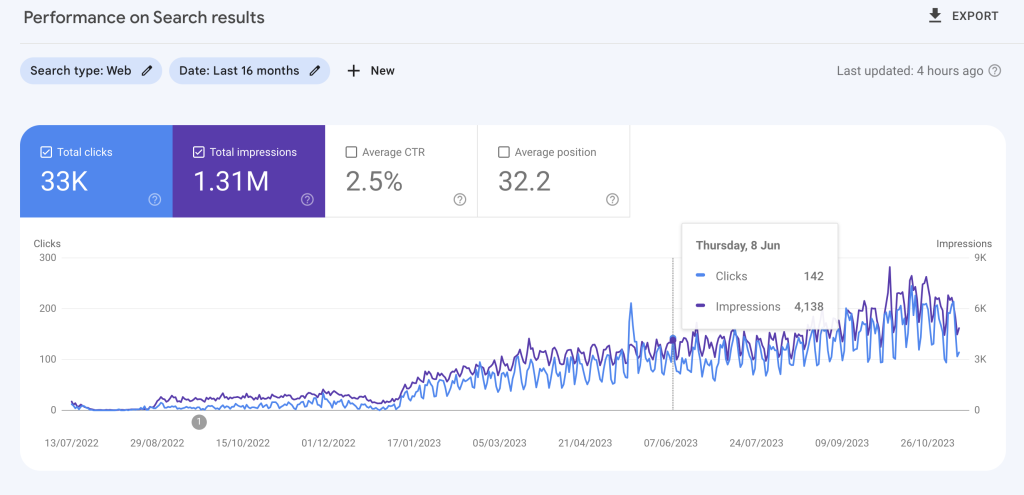
VAZI Legal’s progressive approach to SEO integration and targeted content creation provides a compelling case of success. Here’s a look at their SEO strategy and how it’s fueled unprecedented growth in customer engagement.
VAZI Legal’s SEO Strategy
Their approach was two-fold: mastering SEO for top-tier search engine rankings and delivering content tailored to their audience’s needs. When I take a closer look at the data, the results are evident and commendable.
The term “vazi legal” commanded 1,133 clicks with a 0.47 CTR, making the firm highly visible online. But they didn’t stop there. With keyword optimization, phrases like “types of company registration in Nigeria” drew a noteworthy 206 clicks at a 0.165 CTR. It clearly indicates that a targeted keyword strategy aligned with user queries can significantly boost search engine rankings.
Quality content, high engagement
But top-notch content was their ace. By focusing on specific topics like “conversion of shares into stock”, they secured 192 clicks, a substantial gain in engaging potential clients with a 0.102 CTR.
VAZI Legal’s Success in Numbers
This success isn’t just anecdotal. Their online performance has skyrocketed, securing average top positions in search results with an impressive rating of 1.31 for their branded name. Even niche topics like “vazi legal internship” attracted attention, delivering a 0.509 CTR. They captured a broad audience’s interest, proving that a strong SEO and content strategy is not a nice-to-have but a must-have for today’s competitive African law firms.
Reflecting on VAZI Legal’s success story, it’s clear that a robust SEO strategy is a game-changer for African law firms. It’s not just about securing top spots in search engine rankings. It’s about reaching the right audience with high-quality, targeted content that resonates. The digital landscape is fiercely competitive, and without a strong SEO and content strategy, getting lost in the crowd is easy. But your firm can maintain a strong online presence with continuous monitoring and data-driven adjustments. Remember, it’s not a one-time effort but a long-term commitment. So, if you’re still on the fence about implementing an SEO strategy for your African law firm, take a leaf out of VAZI Legal’s book. It might just be the push you need to take your firm to the next level.
A: A strong online presence is important for African law firms because it helps them reach a wider audience and engage with potential clients. It increases brand visibility, credibility, and trustworthiness in the digital landscape.
SEO strategy helps African law firms improve their search engine rankings, making it easier for potential clients to find them online. By optimizing their website and content with relevant keywords, they can increase their visibility, attract more organic traffic, and generate leads.
Targeted content creation involves creating and publishing content that specifically addresses the needs and interests of the target audience. By understanding the target audience’s pain points, challenges, and searching habits, law firms can create content that resonates with their potential clients and enhances engagement.
A: Delivering high-quality content is important because it showcases the expertise and credibility of the law firm. It helps build trust with potential clients and establishes the firm as a thought leader in the industry. High-quality content also improves the user experience, increases engagement, and encourages repeat visits to the law firm’s website.
A targeted keyword strategy involves optimizing the website and content with relevant keywords. Law firms can improve their search engine rankings by incorporating these keywords in the right places, such as titles, headings, meta descriptions, and within the content. This helps them appear higher in search results when potential clients search for relevant services or information.
A: Continuous monitoring and tweaking of the SEO strategy are essential because the digital landscape is constantly evolving. By analyzing data metrics and monitoring search engine rankings, website traffic, and user behavior, law firms can identify areas for improvement and optimize their strategy accordingly. This ensures they stay competitive and maintain a strong online presence in the long run.

I am available for freelance work. Connect with me via and call in to my account.
Phone: +01234567890 Email: [email protected]